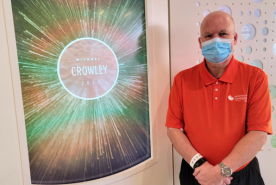May 12, 2023
Meeting with your legislator can feel overwhelming, particularly for first-timers, but remembering the basics can ensure your session goes off without a hitch! All you have to do is follow these 5 W’s for a successful kidney advocacy meeting.
1. Who
[VIDEO::http://www.youtube.com/watch?v=1GdQsmdb884::aVideoStyle]
Ensuring that you are meeting with the right lawmaker is the first step to having a successful meeting. While state legislatures can differ, federal representation is usually three total lawmakers–one federal representative who oversees your district in the House of Representatives and two senators who represent your state in the Senate.
Use this Voices for Kidney Health tool to find your federal representative.
2. What
The “what” is your bill! What are you advocating for? If you are meeting with your federal representative, you may be advocating for one (or all!) of these pieces of kidney legislation:
- Living Donor Protection Act (LDPA): This bill eliminates discrimination against living donors in the procurement of life, disability, and long-term care insurance and codifies existing Dept. of Labor protections for living donors under the Family and Medical Leave Act (FMLA). Insurance companies cannot drop a living donor, change their premiums, or refuse or limit the level of coverage based solely on their status as a living organ donor.
- The Improve Access to Home Dialysis Act (IAHDA): This bill expands patient choice and removes barriers to accessing home dialysis to ensure that all patients are given the opportunity to succeed on the dialysis modality that best suits their needs and preferences, regardless of their zip code.
- The Organ Transplantation Transparency, Accessibility, and Reform Act (OTTAR): The organ procurement and transplantation system needs additional oversight, transparency, and accountability to ensure it is functioning most efficiently on behalf of patients awaiting lifesaving organs. This bill calls for better data collection and transparency across the transplant system and provides focused support for enhancing transplant access for at-risk and underserved kidney patients.
- Appropriations: The cost of treating late-stage kidney disease keeps rising for everyone, including the federal government. Worse, more than one in three kidney failure patients don’t receive kidney care or sometimes don’t even know that they have kidney disease before starting dialysis. By investing more federal funds in programs that promote kidney disease awareness, education, innovation, and research, we can help reverse these troubling trends.
- Expand Access to Medical Nutrition Therapy: Nutrition is a key component to managing and even slowing the progression of kidney disease and overall health. However, many people with kidney disease don’t have access to dietary support. This petition asks Congress to expand people’s access to medical nutrition therapy to ensure patients get the support they need.
3. When
Timeliness is important when meeting with your representatives. Whether on Capitol Hill or in a local office, ensure you have time to find the office and check in with staff. These meetings can be short, so have your elevator pitch ready and make sure you arrive on time. If you are conducting a virtual meeting, be aware of any time zone differences. For instance, there is a three-hour time difference between California and D.C.
4. Where
It is important to know where your meeting is–whether you are going in person or virtually. If you are attending a virtual meeting, knowing which platform you will be on will allow you to prepare in advance so you can download or update your meeting platform.
If you’re going in person, it is important to know that depending on your Representative’s district they could have multiple offices. You’ll need to go to the right office at the right time for a successful meeting since most meetings are only 10-15 minutes and you don’t want to cut into your meeting time.
5. Why
The “why” is the change that you desire to make! Everyone’s “why” may be different depending on your story and the bill you are advocating for. For example, a transplant recipient who received a kidney from a living donor may want to advocate for the Living Donor Protection Act because they don’t want the donor to be penalized for their life-saving gift.
See all the kidney legislative priorities you can advocate for.
Big Victories are Possible with Your Voice

Every member of the kidney community should feel empowered to use their voice, share their story, and encourage positive legislative changes. If you’re new to kidney advocacy, a great place to start is our Voices for Kidney Health action center. In less than a minute, you can send a message to your federal lawmakers about supporting our agenda and becoming a kidney champion in Congress.


















